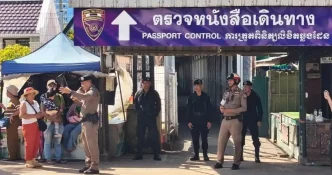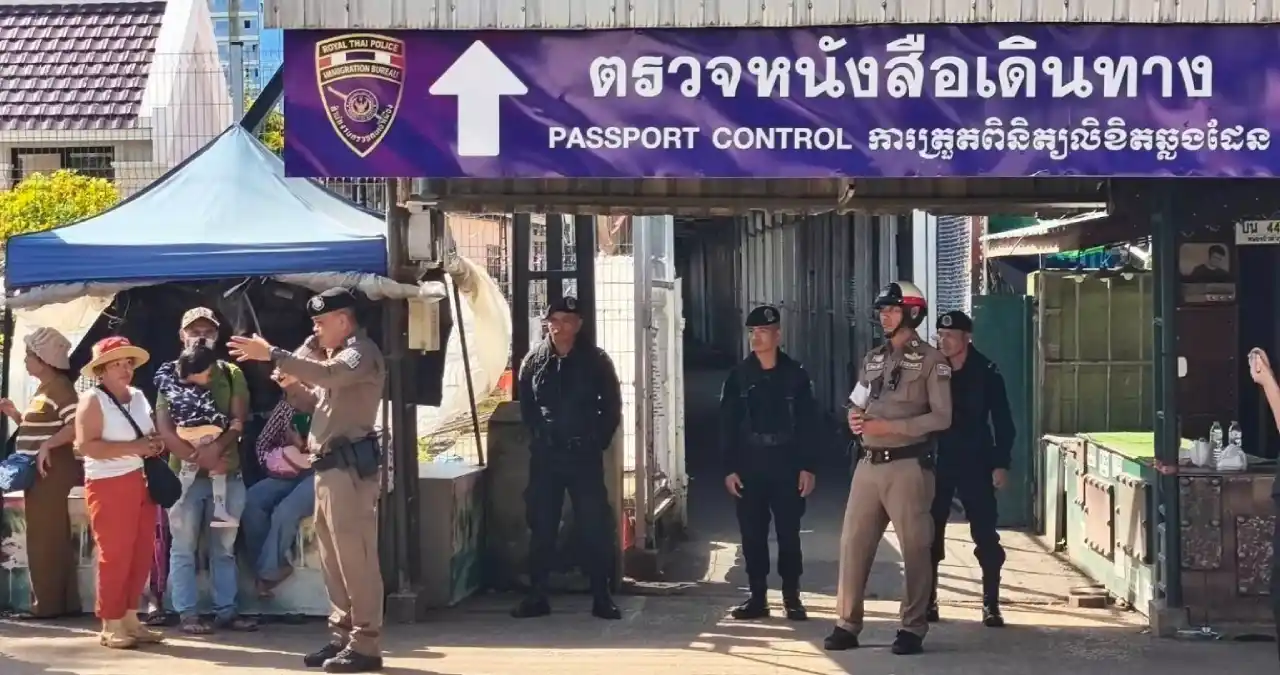Thailand’s Defence Minister Phumtham Wechayachai has firmly dismissed assertions by Cambodian Prime Minister Hun Manet that Thai authorities requested the reopening of border checkpoints, escalating tensions between the two Southeast Asian neighbors over cross-border trade and movement.
In a statement on Monday, Phumtham clarified that no such request was made, countering a recent Facebook post by Hun Manet which suggested Thailand had urged Cambodia to open checkpoints and called on Bangkok to take the initiative. Instead, Phumtham emphasized that the checkpoints remain operational under scheduled hours, with cross-border trade continuing in certain areas. “Thailand has always prioritized peaceful means” he said, underscoring the nation’s commitment to dialogue.
Border Operations and Humanitarian Considerations
The disagreement over checkpoint operations highlights broader frictions in Thailand-Cambodia relations, often complicated by historical border disputes and differing political priorities. Phumtham noted that while the checkpoints are not closed, their limited hours reflect a cautious approach to managing cross-border interactions. He stressed that Thailand has sought to minimize disruptions for ordinary citizens, ensuring that humanitarian concerns are addressed separately from government-level disagreements.
As a gesture of goodwill, Thailand has continued to facilitate access for Cambodian students attending schools across the border and has granted entry to patients requiring urgent medical treatment. “We’ve tried to ensure that ordinary people on both sides are not affected” Phumtham said, highlighting a policy of separating humanitarian issues from diplomatic disputes.
Cambodia’s Internal Challenges and Thailand’s Stance
Phumtham’s remarks also pointed to internal challenges within Cambodia as a potential driver of the current rhetoric. “The main issue Cambodia is facing right now lies within its own borders, while Thailand’s position has always been transparent” he said, urging caution and good judgment in Cambodian public statements. While he did not elaborate on specific internal issues, analysts suggest that domestic political pressures in Cambodia may be influencing Hun Manet’s approach to border matters.
On the international front, Phumtham reiterated Thailand’s refusal to engage with the International Court of Justice (ICJ) over related border issues, stating, “We have no interest in it as we have never accepted its jurisdiction.” He added that other matters are being addressed through established diplomatic channels, with the Thai army providing clarity on checkpoint operations. This stance reflects Thailand’s long-standing preference for bilateral resolutions over international arbitration in disputes with Cambodia, particularly concerning contested territories like the Preah Vihear temple area, which has been a flashpoint in the past.
Economic Impacts and Cross-Border Trade
Cross-border trade between Thailand and Cambodia, valued at millions annually, remains a critical lifeline for communities on both sides. Goods ranging from agricultural products to consumer items flow through checkpoints, supporting local economies in border provinces. Phumtham dismissed concerns that Thailand’s flexibility in maintaining checkpoint access—despite Cambodia’s alleged refusal to reciprocate—would have negative repercussions. “Our aim is to reduce the impact on the public and on businesses” he said, framing the decision as a pragmatic move to avoid a crisis and ensure benefits for Thai citizens.
If Cambodia persists in limiting checkpoint operations on its side, Phumtham suggested that the consequences would primarily affect Cambodian communities. “If Thailand chooses to show flexibility and Cambodia refuses to do the same, that’s their decision. The Cambodian people will have to consider that for themselves” he said. This statement hints at a potential divergence in how the two nations prioritize economic cooperation versus political posturing, with Thailand positioning itself as the more accommodating partner.
According to trade data from Thailand’s Ministry of Commerce, border trade with Cambodia was worth approximately 100 billion Thai Baht (US$2.8 billion) in 2024, underscoring the stakes involved. A prolonged standoff over checkpoint access could disrupt supply chains, inflate costs for traders, and impact livelihoods, particularly for small-scale vendors who rely on daily cross-border exchanges. While no immediate crisis has emerged, the rhetoric from both sides suggests that economic ties could become a casualty of diplomatic friction if unresolved.
Historical Context of Thailand-Cambodia Relations
The current dispute over border checkpoints is just the latest chapter in a long history of tension between Thailand and Cambodia, often rooted in territorial disagreements and nationalist sentiments. The Preah Vihear temple, a UNESCO World Heritage site located on the border, has been a recurring point of contention, with both nations claiming historical rights to the area. A 1962 ICJ ruling awarded the temple to Cambodia, a decision Thailand has historically contested, leading to periodic military skirmishes and diplomatic standoffs.
Beyond territorial issues, the two countries have navigated complex political dynamics, including differing approaches to regional alliances and internal governance. Cambodia’s close ties with China, contrasted with Thailand’s balancing act between Beijing and Washington, have occasionally strained bilateral relations. Additionally, domestic political transitions—such as Hun Manet’s succession of his father Hun Sen as prime minister in 2023—may be influencing Cambodia’s foreign policy tone, as the new leadership seeks to assert its authority both at home and abroad.
Analysts note that border checkpoint policies often serve as a barometer for broader relations. During periods of cooperation, checkpoints facilitate trade and cultural exchange; during tensions, they become symbolic battlegrounds for asserting sovereignty. The current disagreement, while not yet escalating to the level of past conflicts, reflects underlying mistrust that could complicate future collaboration on issues like migration, security, and economic integration within the ASEAN framework.
Public Sentiment and Regional Implications
Public reaction to the border checkpoint dispute varies on both sides of the border. In Thailand, social media posts and local news coverage suggest a mix of frustration and indifference, with many border residents prioritizing practical access over political rhetoric. “We just want to keep trading; politics shouldn’t stop our business” said a Thai trader in Sa Kaeo province, a key border area, in an interview with a local outlet. Meanwhile, Cambodian netizens have expressed support for Hun Manet’s stance, viewing it as a defense of national interests, though some worry about the economic fallout of restricted border access.
Regionally, the spat risks undermining ASEAN’s push for economic integration and borderless trade, a cornerstone of the bloc’s vision. With both Thailand and Cambodia as active members, their ability to resolve bilateral issues amicably is seen as a test of ASEAN’s cohesion, especially amid broader geopolitical challenges in Southeast Asia. Neighboring countries like Laos and Vietnam, which share borders with both nations, may also be monitoring the situation for potential spillover effects on regional trade routes.
Some experts caution against overreacting to the current disagreement, noting that border checkpoint disputes are often resolved through backchannel diplomacy. “This is more about signaling than substance at this stage” said a regional security analyst based in Bangkok. “Both sides have domestic audiences to consider, but neither wants a full-blown crisis that could disrupt trade or draw international scrutiny.”
Looking Ahead: Dialogue or Deadlock?
As the war of words over border checkpoints continues, the path forward remains uncertain. Thailand’s insistence on dialogue and flexibility contrasts with Cambodia’s apparent reluctance to concede ground, raising questions about whether the two sides can find common ground. Phumtham’s comments suggest that Bangkok is prepared to maintain its current approach, prioritizing its citizens’ interests while leaving the ball in Cambodia’s court.
For border communities, the hope is for a swift resolution that prioritizes practical needs over political brinkmanship. With millions in trade and countless livelihoods at stake, the checkpoint issue serves as a reminder of the delicate balance between national pride and regional cooperation. As both nations navigate this latest chapter in their complex relationship, the eyes of Southeast Asia—and perhaps beyond—will be watching to see whether dialogue prevails over deadlock.
















